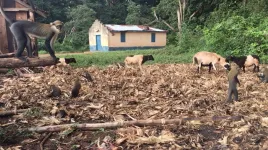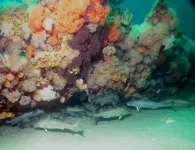Raindrops also keep fallin' on exoplanets
Size of raindrops can help identify potentially habitable planets outside our solar system
2021-04-05
(Press-News.org) One day, humankind may step foot on another habitable planet. That planet may look very different from Earth, but one thing will feel familiar -- the rain.
In a recent paper, Harvard researchers found that raindrops are remarkably similar across different planetary environments, even planets as drastically different as Earth and Jupiter. Understanding the behavior of raindrops on other planets is key to not only revealing the ancient climate on planets like Mars but identifying potentially habitable planets outside our solar system.
"The lifecycle of clouds is really important when we think about planet habitability," said Kaitlyn Loftus, a graduate student in the Department of Earth and Planetary Sciences and lead author of the paper. "But clouds and precipitation are really complicated and too complex to model completely. We're looking for simpler ways to understand how clouds evolve, and a first step is whether cloud droplets evaporate in the atmosphere or make it to the surface as rain."
"The humble raindrop is a vital component of the precipitation cycle for all planets," said Robin Wordsworth, Associate Professor of Environmental Science and Engineering at the Harvard John A. Paulson School of Engineering and Applied Sciences (SEAS) and senior author of the paper. "If we understand how individual raindrops behave, we can better represent rainfall in complex climate models."
An essential aspect of raindrop behavior, at least to climate modelers, is whether or not the raindrop makes it to the surface of the planet because water in the atmosphere plays a big role in planetary climate. To that end, size matters. Too big and the drop will break apart due to insufficient surface tension, regardless of whether it's water, methane or superheated, liquid iron as on an exoplanet called WASP-76b. Too small and the drop will evaporate before hitting the surface.
Loftus and Wordsworth identified a Goldilocks zone for raindrop size using just three properties: drop shape, falling speed, and evaporation speed.
Drop shapes are the same across different rain materials and primarily depend on how heavy the drop is. While many of us may picture a traditional tear-shaped droplet, raindrops are actually spherical when small, becoming squashed as they grow larger until they transition into a shape like the top of a hamburger bun. Falling speed depends on this shape as well as gravity and the thickness of the surrounding air.
Evaporation speed is more complicated, influenced by atmospheric composition, pressure, temperature, relative humidity and more.
By taking all of these properties into account, Loftus and Wordsworth found that across a wide range of planetary conditions, the math of raindrop falling means only a very small fraction of the possible drop sizes in a cloud can reach the surface.
"We can use this behavior to guide us as we model cloud cycles on exoplanets," said Loftus.
"The insights we gain from thinking about raindrops and clouds in diverse environments are key to understanding exoplanet habitability," said Wordsworth. "In the long term, they can also help us gain a deeper understanding of the climate of Earth itself."
INFORMATION:
This research was support by the National Science Foundation through grant AST-1847120.
ELSE PRESS RELEASES FROM THIS DATE:
2021-04-05
DURHAM, N.C. -- Integrating the American classroom has long been a goal of many who seek to eradicate racial discrimination. But a new paper from four economists, including Duke University's William A. "Sandy" Darity Jr., suggests that Black students do not always benefit from attending racially balanced schools.
Instead, Black adults who attended racially balanced high schools in the mid-20th century completed significantly less schooling than those who attended either predominantly black or predominantly white schools, the authors found.
"Standard wisdom has it that school desegregation paves the way to racial ...
2021-04-05
NEW YORK, APRIL 5, 2021 -- Nine of the hottest years in human history have occurred in the last decade. Without a major shift in this climate trajectory, the future of life on Earth is in question. Should humans, whose fossil-fueled society is driving climate change, use technology to put the brakes on global warming?
Every month since September 2019 the Climate Intervention Biology Working Group, a team of internationally recognized experts in climate science and ecology, has gathered remotely to bring science to bear on that question and the consequences of geoengineering a cooler ...
2021-04-05
SARS-CoV-2 showed the world with devastating clarity the threat undetected viruses can pose to global public health. SpillOver, a new web application developed by scientists at the University of California, Davis, and contributed to by experts from all over the world, ranks the risk of wildlife-to-human spillover for newly-discovered viruses.
SpillOver is the first open-source risk assessment tool that evaluates wildlife viruses to estimate their zoonotic spillover and pandemic potential. It effectively creates a watchlist of newly-discovered viruses to help policymakers and health scientists prioritize them for further characterization, surveillance, and risk-reducing interventions.
The tool is linked to a study published in the journal PNAS, in which ...
2021-04-05
New Haven, Conn. -- In a new study, Yale Cancer Center researchers have defined the genetic landscape of uterine leiomyosarcomas (uLMS). Furthermore, using fully sequenced patient-derived xenografts, the team has preclinically validated new treatment modalities, which may point to new treatments for uterine cancer. Study results were published online in an early edition of the Proceedings of the National Academy of Science (PNAS).
Uterine cancer is the most common gynecologic malignancy and uterine leiomyosarcomas (uLMS) are highly lethal sarcomas arising from the myometrium, the smooth muscle layer of the uterus. They represent ...
2021-04-05
Overfishing likely did not cause the Atlantic cod, an iconic species, to evolve genetically and mature earlier, according to a study led by Rutgers University and the University of Oslo - the first of its kind - with major implications for ocean conservation.
"Evolution has been used in part as an excuse for why cod and other species have not recovered from overfishing," said first author END ...
2021-04-05
BOSTON - Men and women whose mothers experienced stressful events during pregnancy regulate stress differently in the brain 45 years later, results of a long-term study demonstrate.
In a unique sample of 40 men and 40 women followed from the womb into their mid-forties, the brain imaging study showed that exposure during fetal development to inflammation-promoting natural substances called cytokines, produced by mothers under negative stress, results in sex-associated differences in how the adult brain responds to negative stressful situations more than 45 years after ...
2021-04-05
High levels of biodiversity in aquatic settings offers a wide range of vitamins, minerals, and fatty acids crucial for human health, a range of nutrients that are lacking in ecosystems where the number of species have been reduced by overfishing, pollution, or climate change, researchers report April 5 in the journal Proceedings of the National Academy of Sciences.
"What we found is that biodiversity is crucial to human health," said Yale's Joey Bernhardt, a G. Evelyn Hutchinson Postdoctoral Fellow in the Department of Ecology and Evolutionary Biology and co-author of the paper.
While humans can achieve their protein requirements even with seafood from less-diverse systems, ...
2021-04-05
A growing body of evidence suggests that biodiversity loss increases our exposure to both new and established zoonotic pathogens. Restoring and protecting nature is essential to preventing future pandemics. So reports a new Proceedings of the National Academy of Sciences (PNAS) paper that synthesizes current understanding about how biodiversity affects human health and provides recommendations for future research to guide management.
Lead author Felicia Keesing is a professor at Bard College and a Visiting Scientist at Cary Institute of Ecosystem Studies. She explains, "There's a persistent myth ...
2021-04-05
EAST LANSING, Mich. - Nine of the hottest years in human history have occurred in the past decade. Without a major shift in this climate trajectory, the future of life on Earth is in question, which poses a new question: Should humans, whose fossil fueled society is driving climate change, use technology to put the brakes on global warming?
Michigan State University community ecologist Phoebe Zarnetske is co-lead of the Climate Intervention Biology Working Group, a team of internationally recognized experts in climate science and ecology that is bringing science to bear on the question and consequences of geoengineering a cooler Earth.
The group's ...
2021-04-05
BOSTON - Addiction is associated with social exclusion, loss of access to resources, and general disengagement from civic life. Now, a study recently published in the journal Psychology of Addictive Behaviors and led by David Eddie, PhD, of the Massachusetts General Hospital's Recovery Research Institute has found that the majority of Americans who have resolved an alcohol or other drug problem report achievements related to self-improvement, family engagement, and civic and economic participation since resolving their addiction. Additionally, it appears these achievements accumulate with time in addiction recovery.
Incorporating data from the Recovery Research Institute's landmark 2017 National Recovery Study, which indicated ...
LAST 30 PRESS RELEASES:
[Press-News.org] Raindrops also keep fallin' on exoplanets
Size of raindrops can help identify potentially habitable planets outside our solar system


